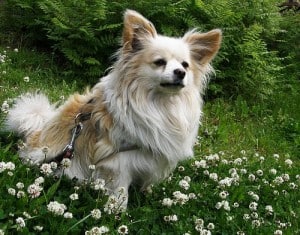Remember that Papillon puppies are not fully grown, nor do they have complete control of their body functions.
Take the puppy outside multiple times per day, and positively reward the puppy when it urinates or defecates outside.
This process can also work when the puppy sits on its own or comes to you.
Catch them being good and reward swiftly.
Patience is the key
Remember that Papillon puppies are just like toddlers, and will need to be given lots of opportunity to learn. Housebreaking is one of the first lessons that most people would like puppies to learn, but it is also one of the hardest.
Puppies have a small bladder and need to frequently urinate. Take the puppy out for a short walk or exercise break at least every hour or two during the day. By avoiding situations where the puppy will have to mess in the house, you can positively reward for good behaviour.
Remember also that sound or movement easily distracts puppies. Try to plan training times in an area where there is a minimum amount of distraction. Avoid having the TV on, or the children playing in the same area.
Allow the puppy to focus as much as possible on the task at hand. Remember also that puppies have a short attention span, so stop the training when you notice the puppy is beginning to “tune out”.
Short, frequent trainings will be more effective than long training sessions.
Never Hit A Puppy
A puppy bonds with a human, and through this bond learns trust and obedience. If there is negative physical contact between the owner and the puppy, this trust and bond is weak, or is not formed at all.
A Papillon that is afraid of its owner will be very difficult to train, and may become extremely shy or very aggressive.
Rewarding for positives, and using a sharp “No” followed by withdrawing attention will be more effective than physical punishment.
It will also strengthen your bond with the dog, and encourage the puppy to learn to work for your praise and attention rather than fear of punishment.
Get In A Routine
Just as you schedule walks, exercise and feeding try to schedule a routine for training. This helps the puppy to understand the difference between play and training, and will encourage them to focus.
Use natural training as well – when the puppy responds correctly to a command outside of the training session, praise them, hug them and give them lots of attention.
Have a positive attitude for the training, and be consistent with your commands and training methods. You will be amazed how quickly your puppy will respond to your commands.
Remember that there will be good days and not so good days, and try to focus on the positives. Understand the characteristics of your papillon and talk to your breeder, trainer or veterinarian if you are noting any unusual behaviour.

